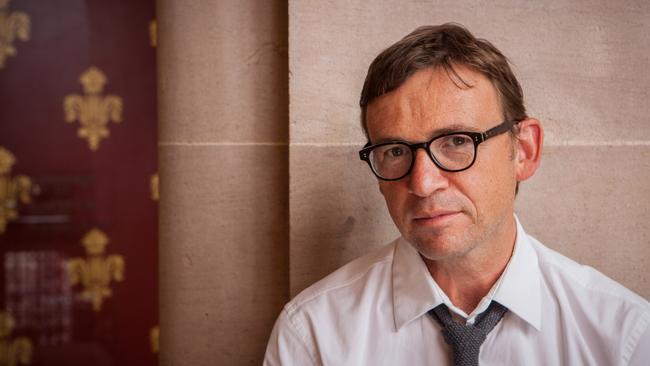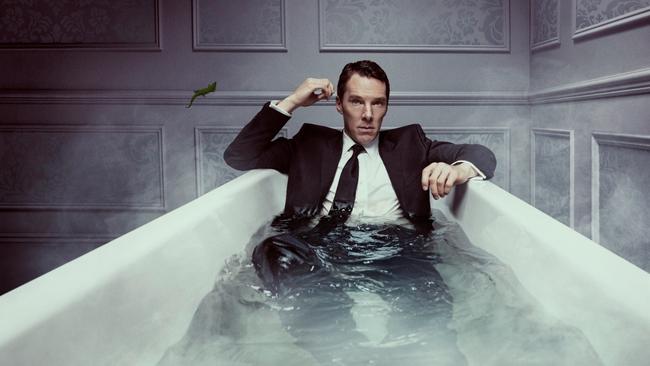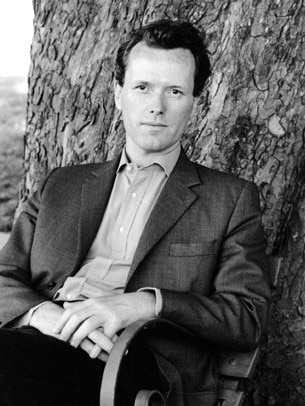Patrick Melrose, David Nicholls, Edward St Aubyn, Benedict Cumberbatch
David Nicholls got the job of adapting the Patrick Melrose novels for the small screen that was so coveted by Harold Pinter.

The Patrick Melrose novels, describing their antihero’s haunted, hilarious journey from childhood trauma to youthful drug addiction to midlife crisis, have been compared by Zadie Smith with the work of Waugh, Wilde and Wodehouse. Alan Hollinghurst called their creator, Edward St Aubyn, “perhaps the most brilliant English novelist of his generation”, and word had it that Harold Pinter wanted to adapt them. In the end, that coveted job went to David Nicholls (sorry, Harold; no pressure, David).
Happily, the writer of One Day has transformed the five books, published between 1992 and 2012, into a splendid new five-part miniseries. Melrose, a thinly disguised alter-ego of St Aubyn, is played by a convincingly louche and damaged Benedict Cumberbatch, who once said it was the role, alongside Hamlet, that he most wanted to play.
We see his ranting young Melrose injecting thousands of dollars’ worth of drugs in a lavish hotel suite in 1980s New York and blacking out with a syringe in his arm. A decade later he’s swapping barbs with Princess Margaret and other acerbic toffs at a country house party. Nicholls’s script fizzes with zingers, many of them culled directly from St Aubyn’s waspish prose. “No man is an island,” says a guest at the aforementioned bash. “Though there are a surprising number here who own one.”
In the opening episode, Melrose, high as a kite, opens the coffin containing his hated father and says, beaming: “It’s just what I wanted. You shouldn’t have!”
A seamless blend of interior odyssey and social comedy, the “Melrosiad” plays out on the fringes of the English aristocracy, which is why Nicholls says it was “a long shot” for him to adapt the books. It’s a world whose decadence and disdain St Aubyn, a former addict who is distantly related to Tsar Nicholas II and whose grandfather was friends with the Duke of Windsor, is well acquainted.
So too Cumberbatch, an Old Harrovian whose grandfather Henry Carlton Cumberbatch was a big figure in London society; he has talked about having “a lock” on Melrose’s milieu. Nicholls, the son of a cake-factory mechanic and a dinner lady, definitely doesn’t.
“I’m very much a tourist in that world,” he says. “I’m a million miles away from that. I’ve always enjoyed that about the novels — it’s sort of an insider’s guide. But I don’t know any posh people.” Nicholls, 51, is hardly slumming it, it should be said. We’re sitting in his impressive balcony office in the Barbican in London, where he has just made me a flat white with his swanky coffee machine. Fruits of a successful career that has included prestige TV adaptations of Great Expectations, Tess of the D’Urbervilles and Far from the Madding Crowd, as well as the novels Starter for Ten and One Day, his high-concept love story revisiting a couple on the same day over 20 years, which sold more than five million copies.
Yet Nicholls, affably angsty and compulsively self-deprecating, dismisses much of that as “comedic and romance stuff”. He had always wanted to adapt the Melrose books, “but realised that because of what I’d done, that probably it was quite a long shot. I know a lot of other people would have loved to have done it.”
Including a certain late Nobel laureate, apparently. “Whenever I hear things like that, part of me wants to put my fingers in my ears! He would have done a brilliant job. Of course he would, he was a genius. Genteel voices being wicked is very Pinteresque.”
Pinter’s influence is certainly felt in the second episode, which contains the defining act of the saga: Melrose’s monstrous father, David (a chilling Hugo Weaving), raping an eight-year-old Patrick at the family villa in the south of France. “If you ever tell your mother or anyone else about today,” David later snarls, “I will snap you in two.”
This mirrors the experience of St Aubyn, who was raped repeatedly by his father between the ages of five and eight. Nicholls and director Edward Berger don’t show the incident graphically, but the scene is no less powerful for that.

Although the rape occurs in the first novel, Never Mind, that has become the second episode of the TV series, a joint production between Sky Atlantic and American network Showtime. Patrick is a child for the whole of that book (he’s played on screen by the excellent Sebastian Maltz) and it would be strange to start the series without its biggest star, Cumberbatch. So the series opens with an adaptation of the second book, Bad News, in which an adult Melrose travels to New York to take possession of his recently deceased father. Flipping the chapters also allows Nicholls to show the effect — Melrose’s drug-addled self-destruction — before the cause, his rape. Cumberbatch is great here, writhing in a fug of heroin and cocaine, loathing and self-loathing. In later episodes he attempts to connect with his ineffectual American mother, played by Jennifer Jason Leigh.
St Aubyn evidently approves of Cumberbatch’s casting. “I’ve spent 25 years being asked if I’m Patrick Melrose,” he said recently. “So it’s a great deal of relief to be able to say: ‘No, Benedict Cumberbatch is.’ ” Nicholls is equally complimentary, and thinks it wasn’t a coincidence that Cumberbatch bracketed Melrose with Hamlet. Like the Dane, Patrick has “mental agility, a wit and a tendency to behave appallingly, but to be always compelling, the obsession with the father and the mother — it’s all there.”
Nicholls’s work has yet to be compared to the Bard’s, being sturdily middlebrow, while St Aubyn flies in more rarefied air. And yes, there are moments in the series that are slightly broader than the source material, such as Patrick’s rather rom-commy meeting with his future wife. Yet it would be a mistake to underestimate Nicholls.
One Day was a tear-jerking phenomenon, which became so ubiquitous that “it took a long time to wriggle out from underneath it”. So he was delighted when his next book, Us, was longlisted for the Man Booker Prize, gaining him admission to a new club of critical approval. His combination of wit and emotional fluency is rather a good fit for adapting St Aubyn, who has spoken about his “fundamental feeling that the world is both heartbreaking and absurd”.
Never is that truer than when Patrick finally tells his best friend Johnny (Prasanna Puwanarajah) about his father’s abuse, only to be interrupted by an overzealous waiter. “It’s a masterstroke,” says Nicholls, “and typical of the brilliance of the books, that even this big confession, the most momentous sentence he will say in his life, is cut with the comedy of the waiter.” It’s just as funny, and moving, on screen.
So Nicholls gets St Aubyn. Even so, he had to lobby for the job. “I had lunch with Teddy to get his approval. I must admit I was a little scared.” Who wouldn’t be? St Aubyn’s writing is, as Nicholls notes, “frighteningly intelligent and incisive”. If he’s calling him “Teddy”, though, it must have gone well.
“I was a little intimidated, but he was extremely charming.” The two rather shy men didn’t talk directly about St Aubyn’s experiences, and certainly not about his father’s abuse; that’s all there in the novels, Nicholls says.
Not that the adaptation was straightforward. The books aren’t powered by narrative; four take place over the space of one day and much of the action occurs inside Patrick’s head. Nicholls had to do lots of intricate work with flashbacks and transpose many of Patrick’s thoughts into dialogue. Has this been his hardest adaptation? “Very much so, yes. It’s been mainly what I’ve done for the past five years.”
He took to walking around London listening to the novels on audiobook, read by Alex Jennings. “Every time I’d get something different from them. The first time I got the wit and the wickedness and the aphoristic quality, then later I started to find them more emotional and touching.”

St Aubyn’s feedback on the scripts was restrained, he says. “He’s been very accepting of the fact that it’s a different beast. Often Teddy’s notes are about smaller things. ‘I’m not sure Patrick would say that … I’m not sure that word is quite right.’ The hardest thing for me when a book is adapted are the great big chunks that are lifted up and put to one side … that’s the one thing Teddy has always been brilliant about.”
The fans aren’t always so understanding, especially when it comes to the classics. “If you do Far from the Madding Crowd or Great Expectations, quite a large percentage of your audience is going to be sitting there ticking things off: there’s that line of dialogue, here comes that scene.” The same was true for the derided film of One Day, starring Anne Hathaway, which Nicholls also adapted. “I definitely felt like there were people going, ‘Oh, they’ve cut that scene’, or, ‘That wasn’t how I imagined it’. For me as well. If I were to do it now I’d probably do it in four hours on television.”
In this respect the Melrosiad was easier to adapt, Nicholls says, because “it occupies almost this perfect position of being brilliant, but perhaps it ought to be better known”. Indeed, if Nicholls envies St Aubyn’s intellect, St Aubyn may well envy Nicholls’s sales. A prominent adaptation should do wonders on that front.
Nicholls’s life has also been less lurid than St Aubyn’s, “I’m pleased to say”. After growing up in Hampshire, he went to the University of Bristol and had a lacklustre spell as an actor before getting his big break as a writer on Cold Feet in 2000. Since then the work has flowed. He lives in north London with partner Hannah, a former TV producer now studying history of art, and their two children, Max, 12, and Romy, 10. This is the first time his children have been properly aware of one of his projects, he says, “and they can’t see it because it’s way too harrowing”.
With Patrick Melrose done and dusted, he has several things on the go, including an adaptation of Us. He did the screenplays of his other books and says he keeps “resolving not to do it because adapting your own work is like cutting your own hair — you can’t be as objective. I suppose in my defence I was a screenwriter before I was a novelist.” Not many people flit between the two as fluidly as he does.
“Whichever I’m doing, I long to do the other one,” he says, which is a rather Patrick Melrose kind of line. “The big difference is I find screenwriting really frightening. There are more people involved — it can be quite combative and I’m not very good at that.”
Most of his energies are now concentrated on a new novel that he doesn’t want to talk about too much. “It would be worrying if you tell someone the story and see them frown or lose interest. It can undermine your confidence a bit,” he says with a laugh. “I’m really enjoying it, but it’s about as un-Melrosian as you can get.” Which, after five years inside Melrose’s head, must come as a blessed relief.
Patrick Melrose premieres on Monday on Foxtel’s BBC First.



To join the conversation, please log in. Don't have an account? Register
Join the conversation, you are commenting as Logout